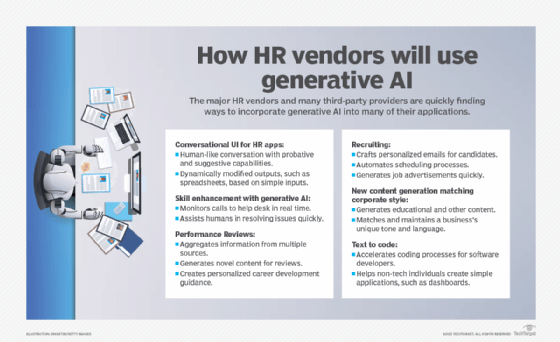
metamorworks - stock.adobe.com
Workday previews a dozen AI agents, acquires Sana
Workday previews 12 agents, with a 13th pending completion of Paradox acquisition.
After introducing its first AI agents for its HR and financial users last year, Workday returns this year with more prebuilt agents, a data layer for agents to feed analytics systems, and developer tools for custom agents.
The company also said it entered a definitive agreement to acquire Sana, whose AI-based tools enable learning and content creation. Workday said the acquisition will cost $1.1 billion and expects it to close by Jan. 31.
Workday has been on a tear with acquisitions this year. It reached an agreement to buy Paradox, an AI agent builder that automates tasks such as candidate screening, texting and interview scheduling. The deal is expected to close by the end of October. In April, Workday acquired Flowise, an AI agent builder.
HR software, in general, is complex compared with enterprise systems such as CRM, said Josh Bersin, an independent HR technology analyst. Because of that, some HR vendors will have to add agentic AI functionality through acquisition. Workday's acquisitions this year coincide with the hiring of former SAP S/4HANA and analytics leader Gerrit Kazmaier as its president of product and technology.
"Workday knows that the architecture they have is not going to quickly get them to the world of agents -- they can't build agents fast enough to work across the proprietary workflow system that they have," Bersin said. "Their direct competitors, SAP and Oracle, are all in the same boat."
Agents, tools to come
Workday previewed several agents to automate HR work, including the Business Process Copilot Agent, which configures Workday for individual user tasks; Document Intelligence for Contingent Labor Agent, which manages scope of work processes and aligns contracts; Employee Sentiment Agent, which analyzes employee feedback; Job Architecture Agent, which automates job creation, titles and management; and Performance Agent, which surveys data across Workday and assembles it for performance reviews.
Another tool, Case Agent, can potentially be a significant time-saver for HR workers, said Peter Bailis, chief technology officer at Workday. He is a former Google AI for cloud analytics executive who also recently joined the company.
"One of the biggest challenges in HR [is when] an employee has a critical question," Bailis said. "But their questions are often complex, and processing times for HR departments are often long."
The case agent can review similar cases in HR, apply the right regional and compliance context, and draft a tailored response for humans to review and deliver.
"The most important part -- caring for employees -- stays human," Bailis said.
On the financials side, Workday previewed Cost & Profitability Agent, which enables users to define allocation rules with natural language to derive insights; Financial Close Agent, which automates closing processes; and Financial Test Agent, which analyzes financials to detect fraud and enable compliance. For the education vertical, Workday plans to release Student Administration Agent and Academic Requirements Agent.
Workday also plans agents that bring the functionality of recent acquisitions Paradox and Flowise to its platform.
Expected in the next platform update is the zero-copy Workday Data Cloud, which brings together Workday data with other operational systems such as sales and risk management for analytics, forecasting and planning. Also in the works is Workday Build, a developer platform that includes no-code features from Flowise that enables the creation of custom agents.

How AI will affect HR jobs
The AI transformation Workday and the rest of the enterprise HR software market is undergoing will likely affect the ratios of HR workers to employees for large businesses, Bersin said.
Currently, many companies aim for an industry standard of one HR employee per 100 employees; with AI agents automating many administrative processes, he said he sees the potential for ratios of 1:200, 1:250, or -- in the case of one client that Bersin's company interviewed -- possibly 1:400.
As such, automation will enable companies to do more work with smaller HR teams.
"In recruiting, there are sourcers, screeners, interview schedulers, people that do assessment, people that look at pay, people that write job offers, people that create start dates, people that do onboarding," Bersin said. "Those jobs, maybe a third of them will go away. In learning and development, there's a new era where a lot of the training content is being generated by AI."
Workday previewed these features and announced the Sana acquisition in conjunction with its Workday Rising user conference in Las Vegas Sept. 15-18.
Don Fluckinger is a senior news writer for Informa TechTarget. He covers customer experience, digital experience management and end-user computing. Got a tip? Email him.






